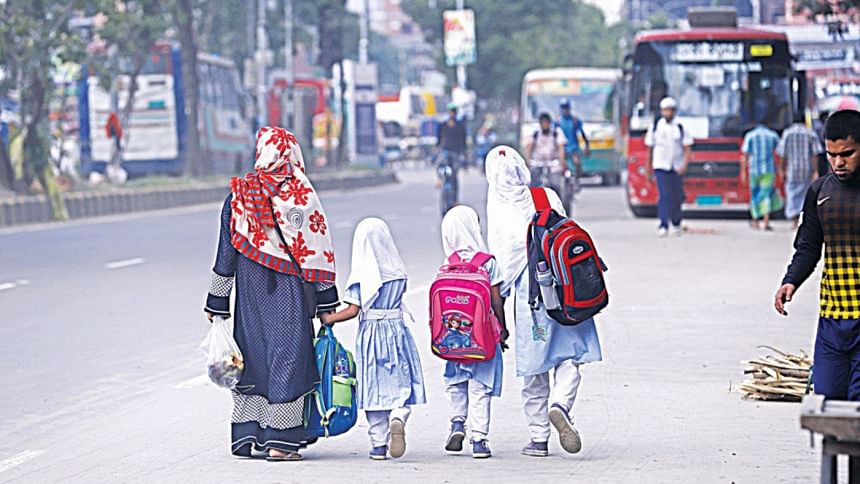Pursuing new approaches to deliver quality education is key

In-person schooling in Bangladesh has remained shut since March 2020. Children have already lost a full year, equivalent to 0.6 learning-adjusted years of schooling based on the learning gap implied by the World Bank (WB) in its Human Capital Index (2020) for Bangladesh. The longer they are out of the formal schooling system, the greater will be the erosion of the foundational skills they had acquired, not to speak of what they would have added to those if the school year were not lost.
Education is generally associated with higher productivity which in turn translates into higher earnings. The science of brain development shows that the productivity effects depend on learning inside and outside of the formal schooling system. However, formal education is critical at early stages because it imparts structured and systematic form of learning. The loss in schooling caused by the pandemic is, therefore, likely to cause loss of lifetime earnings.
What can we guess about the size of lifetime earnings lost already? The WB provided estimates of these losses in South Asia in its latest South Asia Economic Focus report. The estimates for the region provide an anchor for sensing losses in individual countries.
WB estimates that the typical student can expect to lose as much as USD 445 annually because of lost schooling and learning, equivalent to Tk 1900 per month in the Bangladesh context. This is higher than Bangladesh's lower national poverty line and the loss has not stopped yet. The loss already incurred is indeed high if you look at it from the point of view of poor and non-poor low-income families.
Schools not only inculcate life skills but also cater to additional needs, such as food and psycho-social support. So, the loss in earnings could be thought of as just the pecuniary loss that vastly underestimates the total loss comprising both pecuniary and non-pecuniary losses.
The prospect of reopening school has plummeted following an exponential resurgence of the virus recently. The education system cannot function without disruption until the state of the virus spread curve is flat enough to be safe for children and teachers to be in school. A sustainable flattening of the virus spread curve can happen only after we achieve herd immunity through vaccination or infection. The latter is only an option that will befall us with completely uncertain consequences if all other options fail. The WB has projected that vaccination coverage in Bangladesh will not reach 70 percent before the end of 2022. Meanwhile, containing the spread of the virus would require diligent adherence to masking, social distancing and hygiene practices.
How do we manage to educate our children under such circumstances? Clearly, there is need for massive public interventions to ensure an alternative mode of delivering education with universal access. This is not just a question of increasing public spending on education, which is even lower than commonly perceived in Bangladesh. However, the quantity of spending alone is not necessarily going to correct the disruptions caused by the pandemic.
The effectiveness of education spending is now more important than ever. Global evidence assimilated by the WB suggests that "for every 10 percent increase in per child spending, outcomes only improved by 0.8 percent, with the marginal effect higher at lower spending levels." Similar amounts of spending produce vastly different outcomes because of differences in the efficiencies and accountabilities in education systems.
The crisis offers an important reflection point for education leaders to explore new approaches for delivering quality education. Marginalised communities have suffered most education deprivation caused by the pandemic. Schoolchildren in low-income families are the least likely to access remote learning, monitored on their learning loss, have delays to their schools reopening, and to attend schools.
According to the South Asian Network on Economic Modelling (SANEM) household survey done over phone between November and December 2020, only 21 percent of students participated in any form of online education (via TV, internet, etc.) since the pandemic. The participation was much lower in poor households (15 percent) compared with non-poor households (26 percent). The key reason (50 percent) for not participating was the unavailability of online class activities. Lack of access to internet and smart devices was also important (23 percent). Of those who had access, only 28.6 percent felt that online or TV classes are effective.
The measures taken by the government, such as promotion without examination, have largely been directed at protecting the transition of students within the education system with little or no immediate consequence for education outcomes. Anything short of restoring the contact between students and teachers, ideally in person or at least virtually, is just a patchwork that cannot stem the erosion of accumulated learning, not to speak of building on it.
The threat to education is not unique to Bangladesh. Every country is facing it. There is much we can learn from each other about how to minimise the negative impact on education systems. A report published by Unesco, Unicef and the WB in October 2020 found that responses of various countries included remote learning, in the form of online, TV and radio programmes and take-home packages; facilitating access to online learning, most frequently through mobile phones or offering internet access at subsidised or no cost; and providing materials to help guide parents in home-based learning.
These efforts were more common, but not limited, among high-income countries and in environments where resources were already available. More than two-thirds of countries fully or partially reopened their schools. But the experience is mixed. In most of Germany, students have been back in school since May, albeit on a part-time basis with reduced class sizes to enable social distancing. The younger students ignored the latter any way. In Thailand, students go to the bathroom to wash hands before entering the socially distanced classroom. Thailand did not have domestic infection for more than five weeks. In Israel, students were back to school very quickly, but a heat wave prompted the government to waive mask wearing. This caused big outbreaks in schools and a lot of schools shut down.
The key lessons from these experiences are to listen to the health experts and avoid acting on whims. Parents, schools, and entire education systems will need to play new roles to support student learning as the situation remains in flux. Research conducted by more than 220 professors affiliated with the Abdul Latif Jameel Poverty Action Lab (J-PAL) and innovations from J-PAL's partners provide insights into supporting immediate and long-term goals for educating children.
Many parents or caregivers, especially with young children, have taken on new roles to help with at-home learning. Many countries have used SMS, phone calls, and other widely accessible, affordable, and low-technology methods of information delivery to support caregivers and remote education efforts. Governments and NGOs have been experimenting with radio and TV to support parents and augment student learning in areas where internet access is limited. The Indian NGO Pratham collaborated with the Bihar state government and a television channel to produce 10 hours of learning programming per week.
Finding new and innovative ways to deliver quality education can give us all a sense of hope. If the international education community can come together and learn from each other about new ways of providing quality education, it will emerge better equipped to help students thrive in a rapidly changing world. We were worried about learning poverty before the pandemic and about the inequality in learning opportunities. The learning baseline has dropped, and inequality of education opportunities has increased.
The consequences of children missing out on essential academic and social-emotional learning, formative relationships with peers and adults, opportunities for play, and other developmental necessities could, individually and cumulatively, have a cataclysmic impact on the economic and social landscape by leaving a vast number of current and future generations behind.
Zahid Hussain is a former Lead Economist at the World Bank's Dhaka office.

 For all latest news, follow The Daily Star's Google News channel.
For all latest news, follow The Daily Star's Google News channel. 



Comments